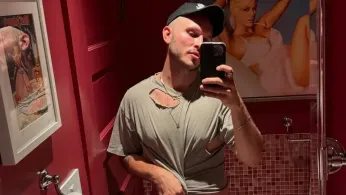
2 hours ago
How Marko Monroe’s Custom Labubu Creations Celebrate Queer Joy and Artistic Expression
READ TIME: 3 MIN.
In a year marked by bold artistic statements and the celebration of individuality, Marko Monroe—a stylist known for his work on Avalon TV and collaborations with A-list talent—has emerged as the creative force behind the custom Labubu craze captivating Hollywood and the global LGBTQ+ community. Labubu, a quirky vinyl toy originally produced by Pop Mart, has found new life through Monroe’s bespoke reinterpretations, which have been embraced by stars like Lady Gaga, Lisa from Blackpink, and Jenna Ortega, celebrated for her role as Wednesday Addams in "Wednesday" .
Monroe’s journey into Labubu customization began organically but quickly gained momentum as celebrities sought out his distinctive, queer-informed approach to style and fandom. “I made everything removable! You can take the wig off! And take the outfit off!” Monroe recalls nervously explaining to Lady Gaga as he personally delivered her custom Labubu. Gaga, renowned for her openness and support for LGBTQ+ artists, responded with characteristic warmth: “I love it just as it is,” she told Monroe, affirming the toy’s whimsical yet meaningful design .
The impact of Monroe’s creations extends beyond mere novelty. The presentation of the custom Labubu to Lady Gaga, for instance, was more than a fan moment—it was a meeting of minds over the evolution of queer performance art. Monroe and Gaga discussed creative differences between her past Coachella set and her recent performances, emphasizing the importance of narrative and emotional connection in modern queer entertainment .
Monroe’s collaboration with Lisa, the K-pop sensation and actor making her television debut in "The White Lotus" season 3, further underscores the global reach of queer-influenced pop culture. By infusing each Labubu with elements unique to the artist’s persona—whether it’s Gaga’s avant-garde glamour or Lisa’s K-pop chic—Monroe bridges the gap between East and West, mainstream and underground, celebrity and fan. The custom dolls have appeared across social media, with Lady Gaga even sporting her Labubu on a designer Kelly bag, earning viral moments that highlight the joyful fusion of fashion, fandom, and queer identity .
The Labubu phenomenon is more than a fleeting trend. For Monroe, these toys represent a playful form of resistance—a way to reclaim joy, celebrate queer imagination, and challenge mainstream conceptions of art and collectibility. “I feel like every fad comes to an end at some point, but right now I'm just enjoying it,” Monroe told "W Magazine", reflecting on the current intensity of the Labubu craze. He also revealed that Pop Mart’s U.S. team has taken notice, opening the door for more high-profile collaborations that could bring queer artistry further into the commercial spotlight .
Monroe’s approach dovetails with a broader movement in LGBTQ+ culture: reclaiming childhood joys, DIY creativity, and fan culture as sites of empowerment and expression. The fact that these dolls are celebrated by queer icons and their audiences alike demonstrates how personal storytelling and playful art can foster community resilience. “I'll be the conduit,” Monroe joked, envisioning himself as a bridge between Labubu’s pop culture origins and a future filled with high-end, artist-driven collaborations .
The resonance of Monroe’s project is not lost on queer fans and cultural observers. In a year when Lady Gaga herself has explicitly reaffirmed her commitment to queer joy—telling *OUT* earlier this year, “I’m going to have the back of the LGBTQ+ community every single day”—the Labubu project feels like a natural extension of the artist-activist relationship at the heart of modern LGBTQ+ culture . Gaga’s embrace of Monroe’s work, and her visible joy in receiving a custom Labubu, send a powerful message about the value of queer creativity, collaboration, and celebration.
The international dimension is equally vital. By intersecting with K-pop, American pop, and global streaming culture, Monroe’s Labubu dolls become a totem of cross-cultural queer solidarity, inspiring fans from Seoul to Los Angeles to reimagine what collectible art can mean in the hands of LGBTQ+ creators.
As Monroe considers future collaborations, including potential partnerships with fine artists and brands, the message remains clear: queer creativity is a driving force in contemporary culture, capable of turning even the smallest toy into a symbol of love, resilience, and self-expression .






